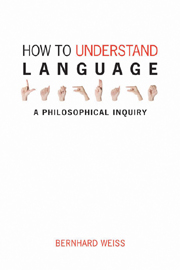Book contents
- Frontmatter
- Contents
- Preface
- 1 The puzzles of language
- 2 The starting-point for analysis
- 3 Analysing sentence-meaning
- 4 Analysing synonymy
- 5 Radical translation
- 6 The structure of a theory of meaning
- 7 Radical interpretation
- 8 Linguistic norms, communication and radical interpretation
- 9 Linguistic normativity
- 10 Radical or robust?
- 11 Language and community
- 12 Rules and privacy: the problem
- 13 Rules and privacy: the solution?
- 14 Truth-conditions versus use-conditions
- Notes
- Bibliography
- Index
11 - Language and community
- Frontmatter
- Contents
- Preface
- 1 The puzzles of language
- 2 The starting-point for analysis
- 3 Analysing sentence-meaning
- 4 Analysing synonymy
- 5 Radical translation
- 6 The structure of a theory of meaning
- 7 Radical interpretation
- 8 Linguistic norms, communication and radical interpretation
- 9 Linguistic normativity
- 10 Radical or robust?
- 11 Language and community
- 12 Rules and privacy: the problem
- 13 Rules and privacy: the solution?
- 14 Truth-conditions versus use-conditions
- Notes
- Bibliography
- Index
Summary
There are a daunting number of deep and difficult questions lurking in the area of the relations between language use and its communal setting. Some we shall need to look at; others will take us too far afield into issues lying at the intersection of epistemology and the philosophies of language and mind. Some questions concern natural language: in what sense is natural language a communal phenomenon? Must it be understood in its communal context? In what sense is natural language a private phenomenon? Must it be understood in terms of private acts of conferring meanings on signs? Can it be so understood? Other questions concern hypothetical languages: could there be a private language, a language that can be understood only by a solitary user? Can there be a language that incorporates some signs only understood by a solitary user? The questions are, of course, interrelated and bring us to further questions about the nature of self-knowledge, of avowals, of ascriptions of capacities, of sensations and private objects. The issues are inherently interesting and important, so we shall be tackling them for their own sake, but we are also trying to find an approach to the philosophy of language and so our aim will be to motivate a certain conception of publicity.
Natural language is essentially communal: semantic externalism
In what sense does one's use of a public language such as English depend on one's membership of a community? Must we understand the phenomenon of English as an essentially social phenomenon or is English merely a product of similarities between the idiolects of particular speakers? In this section we shall look at Putnam (1975: 215–71), who makes natural-kind terms the focus of his attention. His first example indicates a phenomenon that is analogous to those Kripke highlights in relation to names.
- Type
- Chapter
- Information
- How to Understand LanguageA Philosophical Inquiry, pp. 173 - 180Publisher: Acumen PublishingPrint publication year: 2009



